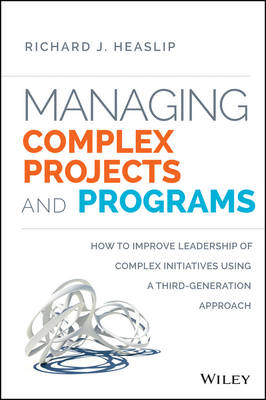
Managing Complex Projects and Programs
John Wiley & Sons Inc (Verlag)
978-1-118-38301-8 (ISBN)
- Titel ist leider vergriffen;
keine Neuauflage - Artikel merken
With the increasing demands of the global business environment, many leaders observe that their organizations struggle to manage complex strategic initiatives. Managing Complex Projects and Programs examines why and offers a solution.
Drawing on the insight of experienced executives and program and project managers from a diverse range of real–world industries, Managing Complex Projects and Programs:
Examines the common reasons for poor performance of modern projects and programs
Introduces new guidelines and an innovative leadership framework for solving performance issues
Provides organizations with a roadmap for redefining the roles of project and program management professionals
Whether you are a current program or project manager, a student of program or project management, or an executive seeking to prepare your organization for a complex and uncertain future, Managing Complex Projects and Programs will challenge you to rethink your approach for managing strategic initiatives and ensuring your organization’s success
RICHARD J. HEASLIP, PHD, teaches Program Leadership Skills and Systems in Organizational Dynamics at the University of Pennsylvania. A former Vice President of project, program, and portfolio management in the pharmaceutical industry, Rick is the Founder of Programmatic Sciences, a consultancy that helps organizations to improve their management of uncertain and complex endeavors.
Preface xiii
Acknowledgments xxi
Part 1 Professional Project and Program Management—Yesterday and Today 1
Chapter 1 The Exhilaration and Exasperation of Project and Program Leadership 3
Leading Projects and Programs 4
Chapter 2 The Emergence of Project Management: First–Generation Programmatics 13
Project Management’s Beginnings 13
Project Management Processes 17
A Growing and Challenging Profession 19
Organizational Responses 21
Chapter 3 The Evolution of Project Management: Second–Generation Programmatics 25
Phase–Gate Approaches 25
Circumstance–Specific Approaches 26
Current Perspectives and Needs 29
An Identity Crisis 31
A Time for Action 32
Chapter 4 Rethinking the Roles and Responsibilities of Project Management Professionals 35
The Exasperados 35
Programmaticists and the Management of Complexity 38
A New Credo 40
Understanding Project and Program Complexity 41
Operational Uncertainty and Complexity 43
Outcome Uncertainty and Complexity 45
Stakeholder Uncertainty and Complexity 47
Environmental Uncertainty and Complexity 49
Organizational Uncertainty and Complexity 51
Reactions to the Complexity Framework 53
Use of the Complexity Framework 55
Chapter 5 Stakeholder Views about the Roles and Responsibilities of Programmaticists 61
Diversity of Views 61
Three Conceptions of a Programmaticist’s Role 63
The Traditionalist Perspective 63
The Operationalist Perspective 66
The Inclusivist Perspective 68
Adoption and Value 70
The Need for Different Kinds of Programmaticists 72
Chapter 6 Modern Problems with Traditional Management Models 77
The Two–Party Fully Governed Project Oversight Model 77
Limitations of the Model 81
Problems with Background Documents 83
Problems with Operational Decision Making 86
Problems with Strategic Decision Making 89
Unsatisfied Needs for Expertise 92
A Search for Solutions 94
Chapter 7 Adaptations of the Traditional Two–Party Fully Governed Project Oversight Model 97
Stakeholder Stories 97
Organizational Growth 99
The Benefits of Growth 99
Responding to Growth–Related Challenges 100
Operational, Technical, and Strategic Review Committees 102
The Unintended Consequences of Review Committees 105
Impact on Decision Making and Programmatic Complexity 107
Portfolio Expansion 110
The Benefits of Pursuing Larger Numbers of Projects 110
Responding to Portfolio–Related Challenges 111
Mixed–Function Review and Governance Committees 115
Business Governance Committees 117
More Unintended Consequences 120
Increased Project Size, Uncertainty, and Complexity 122
The Benefits of Large and Uncertain Projects 122
Establishment of Within–Project Infrastructure 123
The Unintended Consequences of Within–Project Infrastructure 126
The Establishment of Specialty Review and Governance Committees 130
The Unintended Consequences of Specialty Review and Governance Committees 133
Challenges Ahead 134
Chapter 8 Moving Forward 137
Other Approaches 137
Downsizing the Organization 137
Transferring Governance 139
Redefining the Role of a Programmaticist 140
Operationalist Approaches Re–Examined 140
Inclusivist Approaches Re–Examined 145
Building a Centaur 148
Elements of an Improved Project
Oversight Model 153
Part 2 The Promise and Practice of Third–Generation Programmatics 155
Chapter 9 Leading Complex Endeavors 157
The Journey So Far 157
Leadership That Resolves Complex Problems 159
Critical Leadership Roles 163
Adaptive Leadership and the Outcome Sage–Programmaticist 168
Chapter 10 A New Perspective on Programs and Program Management 171
From Adaptive Leadership to Program Management 171
What Is a Program, Really? 174
Redefining Program Management 180
Redefining Projects and Project Management 183
Is It a Program or Is It a Project? 185
Barriers to Acceptance 192
Chapter 11 Introducing Third–Generation Programmatics 195
The Complexity–Management Roles of Project and Program Management 195
Defining Third–Generation Programmatics 197
Roles and Responsibilities in the Three–Party System 200
Projects Sponsored by Governing Committees 203
Programs Sponsored by the Governing Committee 204
Subprograms Sponsored by Programs 209
Other Activities Sponsored by Programs 212
Benefits Expected from the Third–Generation Programmatics Approach 213
Benefits of Distinguishing Projects from Programs 214
Benefits of Distinguishing Project Management from Program Management 217
Benefits of Implementing the Three–Party System 223
Chapter 12 The Decision to Implement Third–Generation Programmatics 225
Choosing Between Two–Party and Three–Party Systems 226
Challenges Faced When Implementing Third–Generation Programmatics 229
Organizational Maturity in the Programmatic Sciences 229
Defining Programmaticist Authority and Autonomy 230
(Re–)Assigning Current Project and Program Managers 235
Identifying and Assigning New Project and Program Managers 238
Defining Reporting Relationships for Program and Project Managers 240
Establishing Departments of Program Management and of Programmatic Science 244
Chapter 13 Developing Programmatic Leadership Competencies 247
The Needs of a Leader 247
Defining “Appropriate” Leadership Behaviors 253
Insights from Research on Program Management Competency 260
Leadership Challenges 264
Defining “Ideal” Leadership Systems and Behaviors 268
Chapter 14 Becoming a Third–Generation Programmatics Organization 271
Applying the Principles of Third–Generation Programmatics 271
Twelve Questions to Answer 275
Deciding to Use a Third–Generation Programmatic Oversight System 279
Life, Viewed Programmatically 282
Final Thoughts 283
Afterword 285
Glossary of Newly Introduced Terms 287
Suggested Readings 295
Standards and Guides in Program and Project Management 295
First– and Second–Generation Programmatics 295
Distinctions between Projects and Programs, Project Management and Program Management 296
Complexity Management 296
Program Leadership Competency Development 297
Index 299
| Erscheint lt. Verlag | 3.10.2014 |
|---|---|
| Verlagsort | New York |
| Sprache | englisch |
| Maße | 170 x 232 mm |
| Gewicht | 594 g |
| Themenwelt | Technik ► Elektrotechnik / Energietechnik |
| Technik ► Maschinenbau | |
| Wirtschaft ► Betriebswirtschaft / Management ► Unternehmensführung / Management | |
| ISBN-10 | 1-118-38301-X / 111838301X |
| ISBN-13 | 978-1-118-38301-8 / 9781118383018 |
| Zustand | Neuware |
| Informationen gemäß Produktsicherheitsverordnung (GPSR) | |
| Haben Sie eine Frage zum Produkt? |
aus dem Bereich


